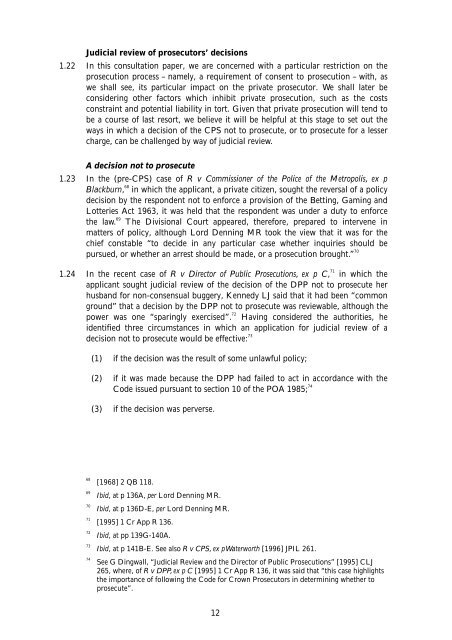cp149 Consents to Prosecution consultation - Law Commission
cp149 Consents to Prosecution consultation - Law Commission
cp149 Consents to Prosecution consultation - Law Commission
Create successful ePaper yourself
Turn your PDF publications into a flip-book with our unique Google optimized e-Paper software.
Judicial review of prosecu<strong>to</strong>rs’ decisions<br />
1.22 In this <strong>consultation</strong> paper, we are concerned with a particular restriction on the<br />
prosecution process – namely, a requirement of consent <strong>to</strong> prosecution – with, as<br />
we shall see, its particular impact on the private prosecu<strong>to</strong>r. We shall later be<br />
considering other fac<strong>to</strong>rs which inhibit private prosecution, such as the costs<br />
constraint and potential liability in <strong>to</strong>rt. Given that private prosecution will tend <strong>to</strong><br />
be a course of last resort, we believe it will be helpful at this stage <strong>to</strong> set out the<br />
ways in which a decision of the CPS not <strong>to</strong> prosecute, or <strong>to</strong> prosecute for a lesser<br />
charge, can be challenged by way of judicial review.<br />
A decision not <strong>to</strong> prosecute<br />
1.23 In the (pre-CPS) case of R v <strong>Commission</strong>er of the Police of the Metropolis, ex p<br />
Blackburn, 68<br />
in which the applicant, a private citizen, sought the reversal of a policy<br />
decision by the respondent not <strong>to</strong> enforce a provision of the Betting, Gaming and<br />
Lotteries Act 1963, it was held that the respondent was under a duty <strong>to</strong> enforce<br />
the law. 69<br />
The Divisional Court appeared, therefore, prepared <strong>to</strong> intervene in<br />
matters of policy, although Lord Denning MR <strong>to</strong>ok the view that it was for the<br />
chief constable “<strong>to</strong> decide in any particular case whether inquiries should be<br />
pursued, or whether an arrest should be made, or a prosecution brought.” 70<br />
1.24 In the recent case of R v Direc<strong>to</strong>r of Public <strong>Prosecution</strong>s, ex p C, 71<br />
in which the<br />
applicant sought judicial review of the decision of the DPP not <strong>to</strong> prosecute her<br />
husband for non-consensual buggery, Kennedy LJ said that it had been “common<br />
ground” that a decision by the DPP not <strong>to</strong> prosecute was reviewable, although the<br />
power was one “sparingly exercised”. 72<br />
Having considered the authorities, he<br />
identified three circumstances in which an application for judicial review of a<br />
decision not <strong>to</strong> prosecute would be effective: 73<br />
(1) if the decision was the result of some unlawful policy;<br />
(2) if it was made because the DPP had failed <strong>to</strong> act in accordance with the<br />
Code issued pursuant <strong>to</strong> section 10 of the POA 1985; 74<br />
(3) if the decision was perverse.<br />
68 [1968] 2 QB 118.<br />
69 Ibid, at p 136A, per Lord Denning MR.<br />
70 Ibid, at p 136D-E, per Lord Denning MR.<br />
71 [1995] 1 Cr App R 136.<br />
72 Ibid, at pp 139G-140A.<br />
73 Ibid, at p 141B-E. See also R v CPS, ex p Waterworth [1996] JPIL 261.<br />
74 See G Dingwall, “Judicial Review and the Direc<strong>to</strong>r of Public <strong>Prosecution</strong>s” [1995] CLJ<br />
265, where, of R v DPP, ex p C [1995] 1 Cr App R 136, it was said that “this case highlights<br />
the importance of following the Code for Crown Prosecu<strong>to</strong>rs in determining whether <strong>to</strong><br />
prosecute”.<br />
12
















